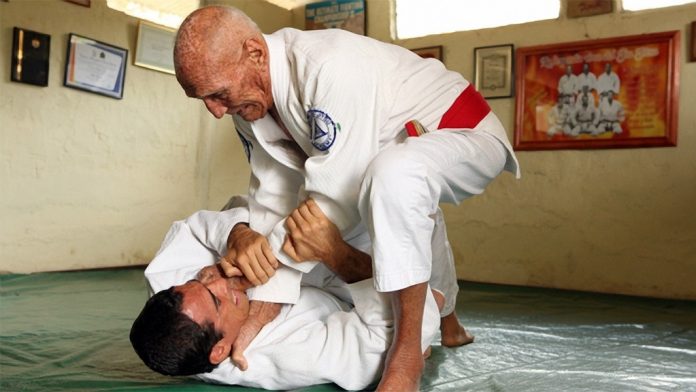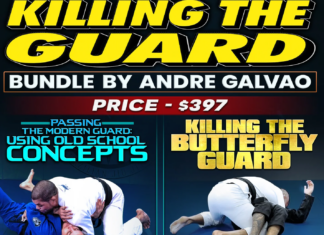
“Age is just a number. It is never too late to do BJJ.”
Over several years of training and coaching, I have seen a lot of people give this advice to older BJJ practitioners. In fact, that advice is always the first thing that comes out of my mouth when someone asks me “Am I too old to start BJJ?,” or “Am I too old to continue doing BJJ?.” Despite this being a common question among older practitioners, I have not seen enough programs specifically targeted toward older BJJ practitioners.
We give them motivation, but we don’t tell them how to train safely and effectively at an older age. We might like to think that age isn’t a factor, but over my years of teaching and training, the reality is that as you age – especially once you reach around 30 to 40 – you begin to see a decrease in the performance of your joints, cardio, strength, speed, and muscle.
According to an article published in Harvard Health, “Age-related muscle loss, called sarcopenia, is a natural part of aging. After age 30, you begin to lose as much as 3% to 5% per decade. Most men will lose about 30% of their muscle mass during their lifetimes.”
This means that continuing BJJ as an older practitioner becomes progressively harder. I have personally seen many older practitioners struggle with the following points:
- Staying effective against younger, faster, and more athletic practitioners.
- Executing modern techniques that require flexibility and speed.
- Getting adequate recovery.
- Suffering injuries while training without proper instructions geared towards older BJJ practitioners.
While I sincerely believe that anyone at any age can safely practice BJJ and enjoy it, the biggest question is “How?”. I believe that more programs that specifically emphasize techniques and mindsets for older BJJ practitioners are needed in the community. This is why I left my full-time job to start helping practitioners 40 and older. I thought that I could be of service to the community since I have a lot of experience teaching older practitioners.
In this article, I have picked three pieces of advice that I give to older practitioners on a regular basis.
1. You do not have to be faster than younger people, just be earlier
The most common question that I get asked by older BJJ practitioners is “What should I do when I roll with someone who is younger and faster?”. As you know, explosiveness significantly decreases as you age. BJJ is a combat sport in which you want to get better grip and move your body to an advantageous position before your opponent does so in order to win. Therefore, speed definitely does matter, and it really is hard to be faster than younger practitioners.
The strategy that you can take is to move “earlier” than your opponent instead of “faster”. In order for you to do this, you have to study and master templates for common jiu-jitsu situations to the point where you do not even have to think about the details, and your body just reacts to the situation during sparring.
The only way to reach that level is having enough repetitions for all the situations through drills and situational sparring. If you do not know which templates you should focus on, be proactive and ask your professor which techniques are suitable for your body type and age after classes or in private lessons.
After enough repetitions, you will be able to execute your techniques earlier than your opponents’ attacks, and while they are using their speed to catch up with you, you can move on to your next step. That is what being one step ahead means.
Since this is such a common question, I have made a video about it on my Youtube channel.
https://youtu.be/E7cTaLy3Ozg
2. Find small successes in your training
You, of course, get the most satisfaction from controlling opponents and tapping them out when training BJJ. However, if you are an older BJJ practitioner, and also a beginner, chances are you will be swept, have your guard passed, and get tapped out over and over again by younger, more athletic, and more experienced people. This is true of all beginners, but if you are an older player, you are even more likely to experience it.
Because of this, many older BJJ practitioners quickly get frustrated and burned out since they do not feel satisfied when they get beat up in training.
Therefore, I always recommend older BJJ practitioners set a small goal before each class. This can be something very simple, such as not getting submitted by an armbar on that day, delaying someone’s submission for five seconds, or setting up a specific guard. If you accomplish those small goals, the objective of your training session has been achieved no matter how many times you got tapped out.
With every little hit of success, you will start to enjoy BJJ more and more and will become more and more proficient at it.
3. Do not neglect recovery
It is a little cliche to say this, but if you are an older BJJ player, you should not neglect recovery.
When you are in your teens and twenties, you can spar hard, go to sleep without stretching or eating a proper meal, and feel totally recovered by the next morning. Unfortunately, this most likely will not be the case for older practitioners, and it is very important that you take care of your body. This includes stretching, eating proper meals, sleeping, etc.
Here’s one simple recovery method that you can easily do; take some form of protein and carbs within 30-60 minutes after sparring.
I see a lot of practitioners stay on the mats and chat after sparring sessions, then drive 30 mins to go home, then take a shower, and only then have a meal. In this case, it’s been 90 minutes or more since the end of training.
However, as I discuss in the following video, your body needs protein and carbs immediately after hard training – so don’t deny this nutrition!
https://youtu.be/2buOBWjR15U
I hope these pieces of advice will help you on your BJJ journey. With my experience teaching and training, I have come to firmly believe that BJJ can help older practitioners to be healthy, gain confidence, and make new friends. However, as a community, we need more support for older BJJ practitioners. Giving small, helpful advice can be one step, starting a dedicated class for older practitioners can be another step, and hosting a tournament for them can also be a good start. Stay safe, and always remember,
“Today is the youngest you will ever be.”
Work Cited
“Preserve Your Muscle Mass.” Harvard Health, 19 Feb. 2016, www.health.harvard.edu/staying-healthy/preserve-your-muscle-mass
Kazuki Umemura


![Darce Choke Encyclopedia – Origins, Mechanics and Variations [2025] BJJ, choke, Brabo, BJJ Darce Choke, D'arce Choke, Darce BJJ Choke](https://bjj-world.com/wp-content/uploads/2017/11/JungPoirierLeeYahoo-218x150.jpg)









![Slicin’ Calves Mikey Musumeci DVD Review [2025] Slicin' Calves Mikey Musumeci DVD Review](https://bjj-world.com/wp-content/uploads/2025/04/slicin-calves-mikey-musumeci-dvd-review-218x150.png)
![Jiu-Jitsu For Old Guys Guard Retention Bernardo Faria DVD Review [2025] Jiu-Jitsu For Old Guys Guard Retention Bernardo Faria DVD Review](https://bjj-world.com/wp-content/uploads/2025/03/old-guys-guard-retention-bernardo-faria-dvd-review-218x150.png)
![X-Guard Trickery Kyle Sleeman DVD Review [2025] X-Guard Trickery Kyle Sleeman DVD Review](https://bjj-world.com/wp-content/uploads/2025/03/x-guard-trickery-kyle-sleeman-dvd-review-218x150.png)
![Countering with Crab Ride Anthony Budion DVD Review [2025] Countering with Crab Ride Anthony Budion DVD Review](https://bjj-world.com/wp-content/uploads/2025/03/countering-with-crab-ride-anthony-budion-dvd-review-218x150.png)
![Closet Closed Guard Craig Jones DVD Review [2025] Closet Closed Guard Craig Jones DVD Review](https://bjj-world.com/wp-content/uploads/2025/03/closet-closed-guard-craig-jones-dvd-review-218x150.png)
![Xanadu Back Takes Levi Jones-Leary DVD Review [2025] Xanadu Back Takes Levi Jones-Leary DVD Review](https://bjj-world.com/wp-content/uploads/2025/03/xanadu-back-takes-levi-jones-leary-dvd-review-218x150.png)

![Total Domination Top Control Mariusz Domasat DVD Review [2024] Total Domination Top Control Mariusz Domasat DVD Review](https://bjj-world.com/wp-content/uploads/2024/09/domination-top-control-mariusz-domasat-dvd-review-100x70.png)


![Roger Gracie Closed Guard System DVD Review [2025] Roger Gracie Closed Guard System DVD Review](https://bjj-world.com/wp-content/uploads/2025/01/roger-gracie-closed-guard-system-dvd-review-100x70.png)

![The Rack Kyle Watson BJJ DVD Review [2025] The Rack Kyle Watson BJJ DVD Review](https://bjj-world.com/wp-content/uploads/2024/12/the-rack-kyle-watson-bjj-dvd-review-100x70.png)
![Heavy Top Game Fabiano Scherner BJJ DVD Review [2025] Heavy Top Game Fabiano Scherner BJJ DVD Review](https://bjj-world.com/wp-content/uploads/2025/01/heavy-top-game-fabiano-scherner-bjj-dvd-review-100x70.png)






![Welcome To The Darce Side Travis Moore DVD Review [2025] Welcome To The Darce Side Travis Moore DVD Review](https://bjj-world.com/wp-content/uploads/2025/01/welcome-to-the-darce-side-travis-moore-dvd-review-100x70.png)
![Closet Closed Guard Craig Jones DVD Review [2025] Closet Closed Guard Craig Jones DVD Review](https://bjj-world.com/wp-content/uploads/2025/03/closet-closed-guard-craig-jones-dvd-review-100x70.png)
![Intro To Hip Mobility for Guard Players Joshua Presley DVD Review [2024] Intro To Hip Mobility for Guard Players Joshua Presley DVD Review](https://bjj-world.com/wp-content/uploads/2024/09/hip-mobility-for-guard-joshua-presley-dvd-review-100x70.png)
![How To Knee Cut Junny Ocasio BJJ DVD Review [2025] How To Knee Cut Junny Ocasio BJJ DVD Review](https://bjj-world.com/wp-content/uploads/2025/02/how-to-knee-cut-junny-ocasio-bjj-dvd-review-100x70.png)

![Mastering Control From Top Position Trent Hidlay DVD Review [2024] Mastering Control From Top Position Trent Hidlay DVD Review](https://bjj-world.com/wp-content/uploads/2024/11/control-from-top-position-trent-hidlay-dvd-review-100x70.png)
![X-Guard Trickery Kyle Sleeman DVD Review [2025] X-Guard Trickery Kyle Sleeman DVD Review](https://bjj-world.com/wp-content/uploads/2025/03/x-guard-trickery-kyle-sleeman-dvd-review-100x70.png)


![Double Sleeve Guard Jon Thomas BJJ DVD Review [2024] Double Sleeve Guard Jon Thomas BJJ DVD Review](https://bjj-world.com/wp-content/uploads/2024/10/double-sleeve-guard-jon-thomas-bjj-dvd-review-100x70.png)



![Special K Guard Neil Melanson DVD Review [2025] Special K Guard Neil Melanson DVD Review](https://bjj-world.com/wp-content/uploads/2025/03/special-k-guard-neil-melanson-dvd-review-100x70.png)